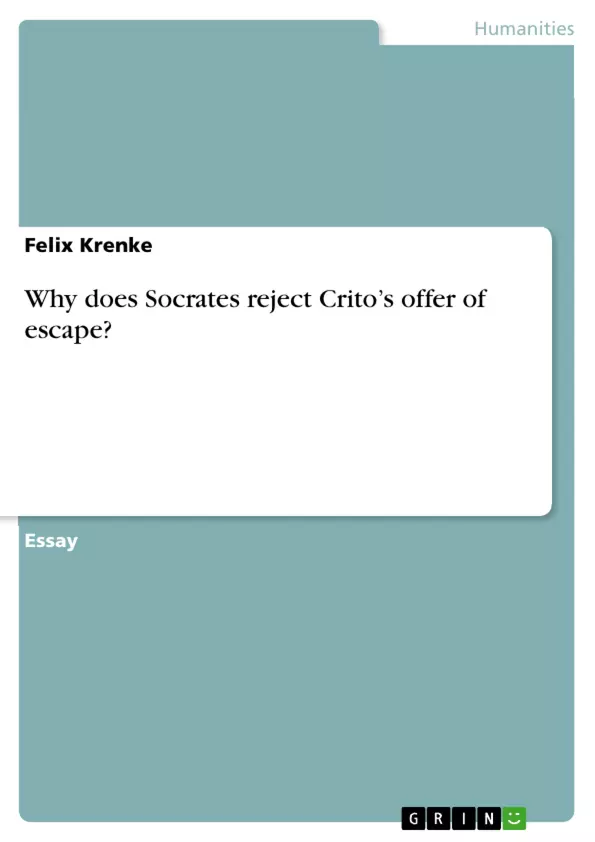Throughout his life Socrates was concerned with morality, justness and the soul. The Apology and Crito tell the story of his trial and imprisonment. He presents his opinions in his conversational way and forges his opinion on morality, justness and the soul into one claim. I tend to regard the dramatic events before his death as a test and I claim he passed. He puts his beliefs in action in the very face of death and sticks to them without contradicting his credo and his actions. In the following I am going to explain and asses Socrates' reasons for not escaping prison as his friend Crito recommended. When Crito tried to pursue him to end his imprisonment on his own account he rejected and debilitated his friends' arguments about why he should leave before his execution. I will go into further detail about Socrates' opinion on obedience and justness as they are presented in Crito. Moreover, I will evaluate his arguments with regard to the Apology which seems to contradict his position in Crito at first glance.
Table of Contents
- Why does Socrates reject Crito's offer of escape?
- Crito's Reasons
- Socrates' Arguments
- The Laws of Athens
- Socrates' Attitude Towards Death
- Socrates' Intentions
Objectives and Key Themes
This paper analyzes the reasons behind Socrates' decision to reject Crito's offer of escape from prison. The author argues that Socrates' actions are consistent with his philosophy of obedience and justness, even in the face of an unjust sentence. The paper also explores the relationship between the individual and the state, and Socrates' views on death.
- Socrates' philosophy of obedience and justness
- The relationship between the individual and the state
- Socrates' views on death
- The consequences of disobeying the law
- The role of the state in education and morality
Chapter Summaries
- Why does Socrates reject Crito's offer of escape? This chapter introduces the main topic of the paper, outlining the historical context of Socrates' trial and imprisonment. The author presents Socrates' commitment to his principles, even in the face of death.
- Crito's Reasons This section examines Crito's arguments for Socrates to escape. It highlights Crito's concerns about Socrates' reputation, the well-being of his friends, and the impact on his children.
- Socrates' Arguments This chapter analyzes Socrates' response to Crito's plea, emphasizing his commitment to living a just and honorable life. The author explores Socrates' assertion that one must never commit an act of injustice, even in response to injustice.
- The Laws of Athens This section focuses on Socrates' dialogue with the Laws of Athens, where he argues that citizens owe obedience to the state, regardless of individual opinions about the law. The author explores the implications of this relationship for individual rights and responsibilities.
- Socrates' Attitude Towards Death This chapter examines Socrates' views on death, highlighting his belief that a true philosopher should welcome death as a release from bodily needs and a path to true wisdom. The author discusses the potential contradiction between Socrates' acceptance of death and his actions in the trial.
Keywords
This paper explores the themes of obedience, justice, the individual and the state, and Socrates' philosophy of virtue and goodness. It focuses on the historical events of Socrates' trial and imprisonment, and his dialogue with Crito and the Laws of Athens. Key concepts include just agreements, the right to life, and the relationship between morality, law, and social order.
- Citation du texte
- M. A., M. Ed. Felix Krenke (Auteur), 2014, Why does Socrates reject Crito’s offer of escape?, Munich, GRIN Verlag, https://www.grin.com/document/1007994



